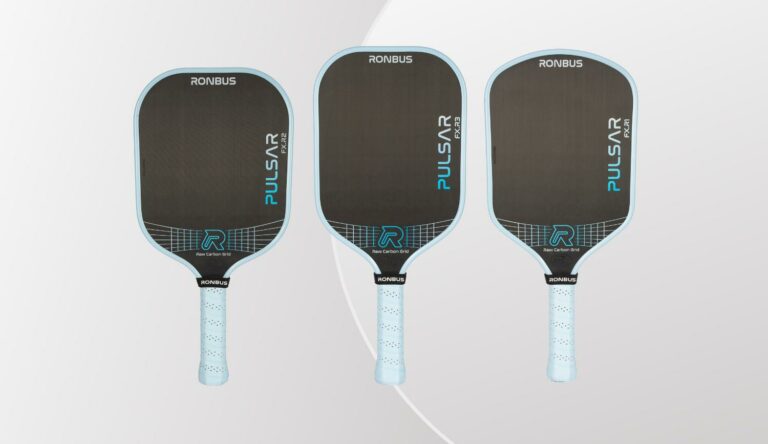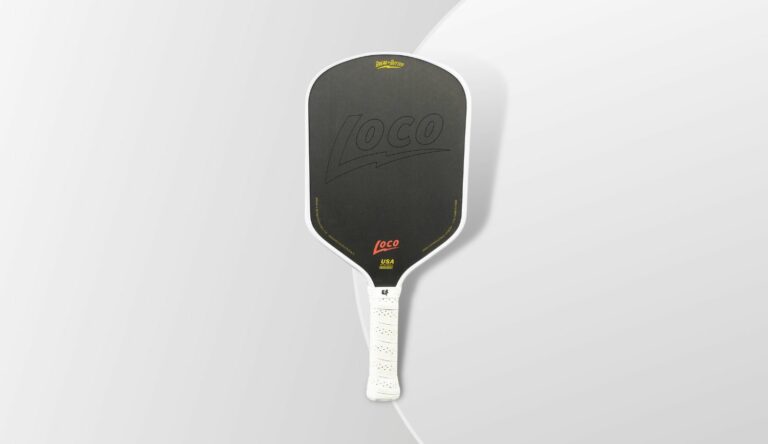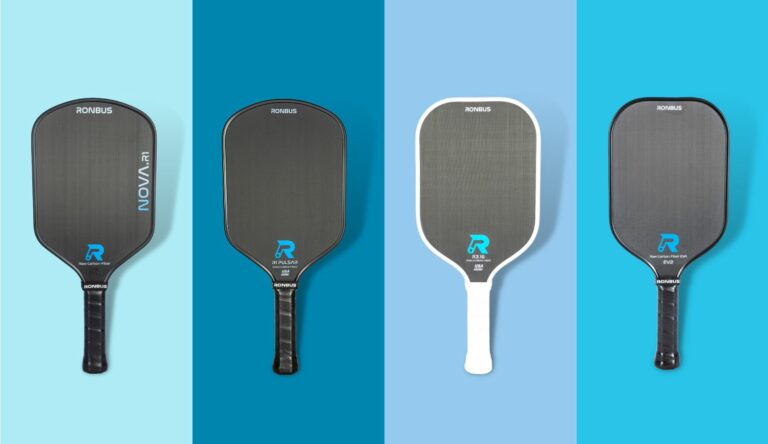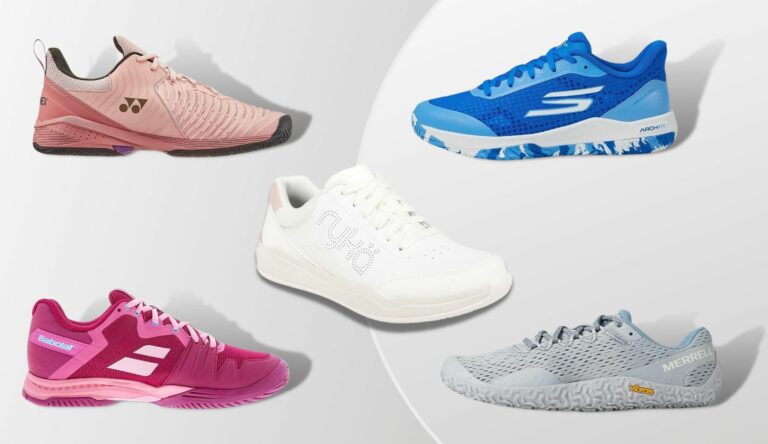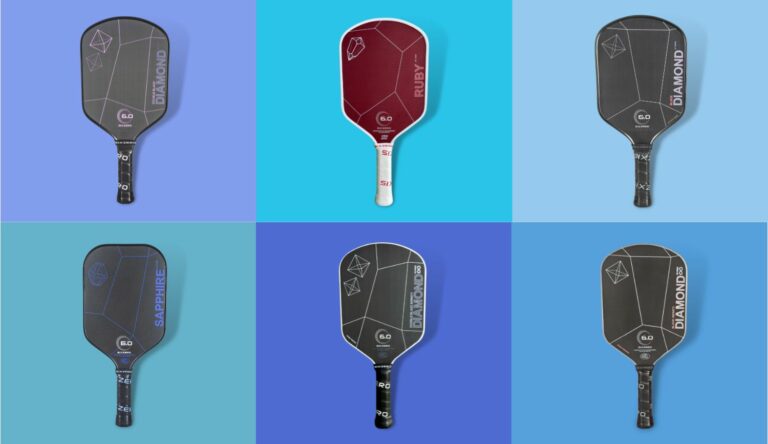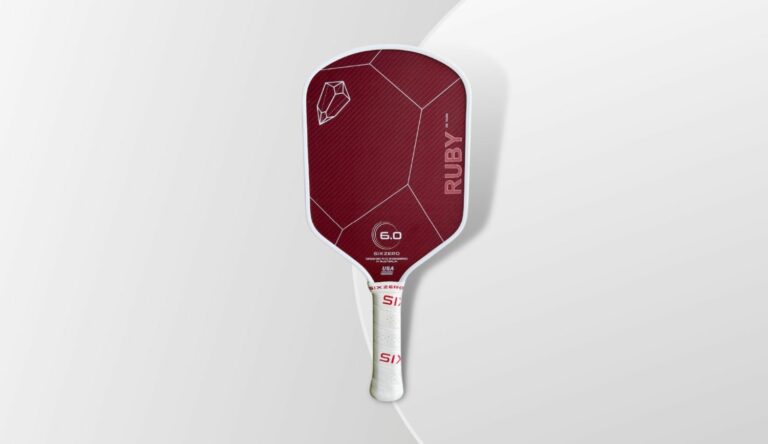Pickleball is a blast. If you’ve jumped into the pickleball world, you’ve probably become a bit obsessed with the sport. Welcome to the club!
Going to your first pickleball tournament is a big jump. It’s not just fun and games anymore. Well, it is, but the emotional stakes feel completely different than your local rec games!
Tournaments won’t appeal to everyone. They can be stressful and not very fun for people who play pickleball simply for exercise and enjoyment. But they’re an absolute blast for people who want to dive deeper into the sport and unleash a bit of their competitive side.
It’s not just the game of pickleball that makes a tournament so fun. It’s the whole experience. The novelty, new friends, hugs, unique strategies, smiles, personal tests, high fives, competitive reality checks, laughter, and so much more.
I see a lot of the same mistakes made by players in their first few tournaments, and I’m here to help you avoid making those mistakes.
Because of this, it can be easy to overthink an upcoming tournament, which sets you up for anxiety.
I want you to have the best experience possible at your next tournament, which is why I made this post. Read it in full, and you should feel comfortable preparing for and thriving in your next pickleball tournament.
Let’s dive in!
Contents
- 1. Start your prep days before the tournament
- 2. Be sure to pack adequate supplies
- 3. Consider arriving to the venue early
- 4. Focus on playing consistently within your abilities
- 5. In doubles, prepare to have the ball hit to you less (or more) than you’re used to
- 6. Be prepared to have your mental game tested
- 7. Keep the dynamic with your partner supportive and dialed in
- 8. Don’t be afraid to utilize your timeouts
- 9. Be ready to face skill imbalances due to sandbagging
- In conclusion
1. Start your prep days before the tournament
To perform at your best, you’re going to want to take care of your mind and body in the days leading up to your competition.
Here are some essential pieces of advice for the week leading up to your tournament:
Stay hydrated and well-nourished. It’s always important to get adequate water and nutrition intake. But this is especially important before and during a multi-day tournament.
Prioritize sleep and rest. Adequate rest is another essential component of health and well-being that’s particularly important before and during a tournament. Some tournaments will have you playing hours a day for multiple days. A couple of days before the tournament, you should lay off competing in any practice matches or doing any serious training.
Get some practice in with the official ball of the tournament. Most tournaments announce the ball contestants will play with prior to the tournament. It’s always good to get some practice reps in with that ball. This will keep you from being caught off guard since certain balls feel different to hit with. You don’t want to start the tournament losing points while adjusting to a new ball.
Practice in a competitive setting prior to your tournament. Around a week before your tournament, it’s a good idea to set up some practice matches with people who are similar in skill level to you and treat them like tournament-level games. Setting a tone like this helps you mentally prepare for a real tournament setting. You can also better identify any weaknesses as a team, either mentally or strategically.
Schedule practice matches. One week before your tournament, you want to schedule a few practice matches with individuals who are similar in skill level to you or those that you can beat. This is a good way to get easy practice and build your confidence. You never want to over-practice, but a few good matches are always a smart idea.
Do some light working out as the day approaches. The day before your tournament, you want to stay loose but not overwork yourself. Do some light stretching and a couple of hitting sessions if possible, but avoid making yourself sore.
2. Be sure to pack adequate supplies
For a successful tournament weekend, you want to be sure you have every packable item covered, including hydration, food, and equipment. You’ll likely be playing several games each day, and your matches may be spread out, so prepare to be there all day.
Here are some key items you won’t want to miss:
Liquids. Dehydration can kill your physical momentum and mental edge in a pickleball tournament. You’ll want to fill your water bottles before you leave and pack plenty of spare water for refills. Try to avoid relying on the venue for your hydration needs, as water bottle fill stations can sometimes be sparse and far away from some courts where you’ll be competing. Electrolytes are your friends, as well.
Food items. You don’t need to have a special diet for your tournament, but you should focus on providing enough healthy fuel for your body and mind so you can perform to the best of your abilities. Light but nourishing and filling foods are best. It’s good to always have a snack on hand in your bag, ready to go. Gum can be nice, too, if that’s your thing.
Spare clothing. You’ll want to bring a number of shirts, underwear, socks, and towels. This is doubly true for people who sweat a lot. I personally prefer to switch out my socks between every match. I also like arm and leg sleeves for both compression and sun protection.
Seating and shade providers. You’ll want to bring your own foldable chairs and hats, umbrellas, shade providers, and sunscreen. It’s not uncommon to have to play your games out in the open during peak sunlight hours, and you’ll likely have downtime between matches. Just make sure you don’t sit down the whole time between matches. Stay loose so you don’t cramp up.
Spare paddle(s). You never know what might happen with your gear. I know of multiple people who’ve had paddles unexpectedly break on them during tournaments. It’s always good to have a second paddle ready to go for this reason.
It’s best to make a list of these items and double-check that you’ve packed everything before leaving. Being on top of this will ensure that you don’t leave anything behind and usually helps put you at ease.
3. Consider arriving to the venue early
It’s never a bad idea to arrive at any tournament venue or event early. If you get to your tournament an hour or more before your first game, you’ll be able to take a moment to get acquainted with the facilities.
You can map out the locations of registration booths, restrooms, water fountains, etc. You can also double-check where your first match will be.
Having this time to get comfortable can be a total game-changer. Consider the opposite: arriving late and missing the start of your match, which can get you penalized. This will cost you more than the simple penalty; it’ll likely throw you off mentally as well.
I personally find it ideal to arrive early enough that I can get a couple of games in before the tournament starts. It’s common for teams to warm up with a quick match against another team. This gets you in the zone and prepares you to come out of the gate comfortable and strong in your first real match.
You will, of course, want to warm up before your first match as well. You should never go straight into your first game, or any game, without having gone through at least five minutes of warm-ups to ready your body and mind for competition.
I also take time to scout my competition if they’re actively playing matches. You can get a jump on them by watching their playstyle and looking for potential weaknesses in their game. It’s great to do this with your partner so you can discuss strategies to capitalize on what you’re seeing.
4. Focus on playing consistently within your abilities
When the time comes for your first game, you want to remember to stay measured and always play your most controlled game.
Playing a slow and patient game is great advice. You want to go for consistency over winners every time. Don’t gamble on your shots or serves unless you have a solid lead and want to polish your edge before the next game.
It’s important to keep your impulses in check. Don’t attack balls because you’re impatient to win a point. Attack them because they’re attackable, i.e., above your waist.
Keep it simple. Serve deep, return deep, dink, and play the slow game. Limit unforced errors as much as possible and attack your opponents in the middle, at their ankles, at their backhands, and at any weaknesses you pick up on.
Avoid strategies that you and your partner haven’t practiced enough. I’ve seen teams try to force stacking in a tournament before they’d practiced the method thoroughly. Their lack of preparation led to sloppy stacking, which their opponents took note of and capitalized on, forcing a lot of errors and a loss for the stacking team.
5. In doubles, prepare to have the ball hit to you less (or more) than you’re used to
When it comes to rec play, we want to win, but we also want everyone to feel included and have a good time.
But in tournaments, throw that out the window. People are there to have fun, of course, but they’re paying money to play with the primary focus of winning. They’ll do whatever they can to win and stay alive in the tournament for as long as possible.
Because of this, you can expect teams to focus like a laser on targeting their weaker opponents, because that strategy helps them win.
So if you’re the stronger player on your team, you will likely be targeted far less. The opponents will try to force mistakes out of your weaker partner, and when they do, you’ll likely get smashed on after your teammate pops balls up for your opponent to smash at you.
Alternatively, if you’re the weaker player, expect them to target you relentlessly. This puts a lot of pressure on you, which gives you the opportunity to prove yourself and beat on them for picking that strategy—or it stresses you out and causes you to make mistakes.
This is just the reality of competitive play, so you’ll have to accept it.
You’ll want to capitalize on this strategy, too. So figure out who the weaker opponent is, and go after them as much as you can.
6. Be prepared to have your mental game tested
Tournaments, especially your first few, are inherently stressful and put a lot of pressure on your mental state. And the mental game of pickleball is an incredibly important aspect of your performance.
It’s impossible to expect zero nerves heading into a tournament, but excess nervousness and anxiety will wreak havoc on not just your team’s results, but also on your overall experience and enjoyment of the game.
I know a lot of players who didn’t play to their ability and reflected after the tournament that they wished they’d laughed more and worried less.
So do what you can to steady your mental states and emotions. Allow yourself to get a bit nervous; it’s normal. Try to remain mindful of the big picture. This is just a game, and your nervousness will not help you perform better in any way. Allow that nervous energy to be channeled into excitement.
Work to keep your breathing rate slow and steady, and work to treat every game you play like a rec game, at least on an emotional level.
Try not to let yourself get stuck ruminating on the whole tournament or the game at hand during play. Focus on winning the rally you’re playing right then and there. This will keep you far more grounded and consistent.
There are a whole host of strategies that you can use to help regulate your emotions. I personally work on my mindset regularly and utilize some natural supplements to keep me calm and focused during tournaments, including supplementing with l-theanine, GABA, and magnesium.
7. Keep the dynamic with your partner supportive and dialed in
Errors and other challenges will always crop up in doubles pickleball – especially under the stress of tournament-level play.
There’s an art to playing doubles graciously and keeping both you and your partner uplifted and performing to the best of your abilities.
You never want to react critically when you or your partner make a mistake. Rolling your eyes or fiendishly criticizing their play just adds stress and takes both of you out of the zone.
Most partners that feel unsupported or criticized by your speech or body language will not be better able to execute strategy. Harsh energy almost always has the opposite effect. It drives you apart and adds to feelings of stress and pressure.
The best thing you can do to keep you and your struggling partner on track is to encourage them. Don’t dwell or ruminate on their mistakes, inwardly or outwardly.
Move on and talk constructively about strategies for the next point. Keep the focus on your opponents weaknesses that reveal themselves throughout the match, and work together to set up and execute specific shots that you know are your strengths.
Smile and keep working together as a team. Focus your energy on the opponent, instead of your partner. Instead of saying “you should” or “don’t do”, highlight the opponents themselves and where you can take advantage of opportunities. This takes the emotional heat off of a struggling partner and allows them to focus their energy on the opponent in a constructive way.
If your partner is clearly struggling and in their head, be as encouraging as possible. Uplifting their emotional state is the best strategy to get them back in the game and play to the best of their ability. Punctuate your positive comments with high fives or fist bumps. Whatever you can do to make them feel like you have their back and support them no matter what.
8. Don’t be afraid to utilize your timeouts
You get two timeouts a game, and they can be significant momentum changers when used wisely.
A lot of newer tournament players don’t think to use their timeouts when they would clearly benefit from them.
There are a few times that I’ll utilize a timeout:
- When the other team is on a roll. The momentum is always swinging in pickleball. Sometimes a team goes on a run and scores point after point. If an opponent is on a run and has scored four or more points on us, I’ll use a timeout in an attempt to reset and break their momentum.
When my teammate or I just need a break to reset. Sometimes you just get a bit overwhelmed or out of sorts when playing a bunch of tournament games. A timeout allows you to take a breather, reorient, and get some quick hydration or calories into your system.
To get a moment to discuss strategy. As the game develops, there’s often a lot of information that shows up, which will affect how you employ your strategies. A timeout gives you the opportunity to assess and re-adjust your team’s strategy in real-time.
9. Be ready to face skill imbalances due to sandbagging
Sandbagging is when someone “plays down” by entering a bracket that’s beneath their skill level in order to face weaker competition.
This behavior is unfortunately common in competitive pickleball and other sports. And it’s very discouraging for people who enter tournaments at their correct skill level.
So don’t be surprised if, in your 3.5 tournament bracket, you end up facing numerous 4.0+ opponents. You have to be prepared for this sad reality, where for certain people, winning at all costs trumps honesty and fair play.
You can better avoid sandbaggers by playing in sanctioned tournaments that use rating systems like DUPR. These systems can better filter out dishonest players.
I’ve written more about sandbagging in pickleball here.
In conclusion
Hopefully, this post has helped you plan for your next tournament. If it’s your first tournament, I hope you have a wonderful time!
The most important thing to remember is to play slowly and patiently. Playing too fast and anxiously will make you play worse and not have as good of a time.
What are you most excited about or anxious about concerning pickleball tournaments? If you’ve been to some already, what are your favorite aspects of tournaments?
Let us know your thoughts in the comments below.

